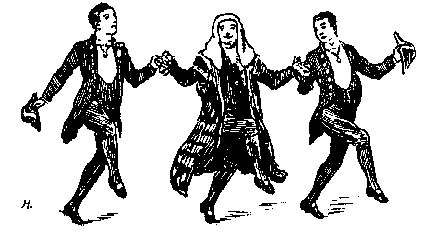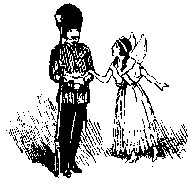Gilbert & Sullivan Opera
A History and a Comment
by H. M. Walbrook
CHAPTER VIII.
A MERRY LORD CHANCELLOR.

The last performance (the 578th) of the initial run of Patience took place at the Savoy on Wednesday night, November 22nd, 1882; then for two nights only the theatre was closed to the general public, and on the Saturday night, November 25th, it was reopened for the first performance of Iolanthe, or The Peer and the Peri. The story of the new opera had got abroad in advance. By some means or other, Dr. Louis Engel, the musical critic of the World (at that time under the editorship of Mr. Edmund Yates), and the vigorous weekly rival of Mr. Labouchere's paper, Truth, had got hold of it, and had published it in considerable detail in his weekly column. This may or may not have quickened public curiosity in the production. In later years such divulgings were rigidly prevented.
On the morning of the production the following appeared under the Savoy Theatre's advertisement in the London newspapers:
To accommodate to some extent the overflow of applications for boxes and stalls for tonight, the First Circle has been numbered and reserved. The remaining seats can be booked this morning at 4s. each.
Needless to say, the house was packed when Sullivan was seen making his way up the little flight of steps that led to the conductor's chair. Needless also to say that the audience was a highly distinguished one. At any rate, all the papers said so afterwards, and some of them gave lists of those present. Alas, how meaningless today those records of the distinguished and the brilliant appear! Lord This, Lady That, and Sir So-and-So, Bart. No doubt they meant something then, but Fame has long since passed them by, and today they mean little or nothing. Of all the names I have read as "among those present" on this occasion, only two have any significance now, those of George Grove, the Editor of the "Dictionary of Music," and Captain Shaw (afterwards Sir Eyre Massey Shaw) the head of the Metropolitan Fire Brigade; and even of these, one owes all its "immortality" to the fact that it occurs in the opera itself. We read that Captain Shaw had a seat in the centre of the stalls, and that when the Fairy Queen sang
- 0 Captain Shaw!
- Type of true love kept under!
- Could thy brigade
- With cold cascade
- Quench my great love, I wonder!
he looked very embarrassed. Well, well, perhaps he was, and perhaps he was not. In any case he must have known what was coming, so let us hope that upon the whole he rather enjoyed it, and that his embarrassment was more simulated than real.
This opera satirizes a social caste in which success depends upon manners rather than upon mind, and in which position and prestige have been inherited rather than earned; and the picturesque objects of the satire are the members of the House of Lords. When one of their Lordships hears that the Lord Chancellor has been engaged in a painful discussion with himself, he moralizes thus: "This is what it is to have two capacities. Let us be thankful that we are persons of no capacity whatever.” A ballad on the general uselessness of the British Upper House concludes as follows:
- And while the House of Peers withholds
- Its legislative hand,
- And noble statesmen do not itch
- To interfere with matters which
- They do not understand.
- As bright will shine Great Britain's rays
- As in King George's golden days.
and in the second Act there is a little scene in Palace Square between two Peers, in which each nobleman (both in Court dress, by the way) sadly and politely expresses his love for the other and at the same time his desire to put him to death, which is a convulsingly funny exhibition of gentlemanly idiocy. And, all the time, the noblemen themselves are the only persons in the play who recognise their own imbecility. The ladies — all of whom, with the exception of Phyllis, are Fairies — find them delightful. "Charming persons, are they not?" says one; and the reply comes: "Distinctly. For self-contained dignity, combined with airy condescension, give me a British Representative Peer. . . Aren't they lovely?"
All this dainty absurdity, wedded to some of Sullivan's most characteristic music, renders the opera one to be seen with pleasure over and over again. Every side of Sullivan's genius is represented in the score. The Fairy Queen's song, "Into Parliament you shall go," is one of his gayest melodies; “When Britain really ruled the waves" is one of his most stirring; Iolanthe's last song to the Lord Chancellor is one of his most pathetic. On the first night the whole of the sparkling finale to the first Act was encored, and for years it was the rule both in London and in the Provinces for this entire finale to be repeated. The Lord Chancellor's description of his nightmare has a masterly orchestral accompaniment. The "Faint Heart never won Fair Lady" trio, with its subsequent wild dance for the Lord Chancellor, has a fascination which time has not withered nor custom staled, and the songs of the Sentry and of the Fairy Queen in the second Act are other famous things. Indeed, there is not a dull bar in this most beautiful and varied score. From the first entry of the Fairies, to the concluding joyous chorus of the entire corps dramatique (all of whom now wear wings!), the music is charming. The sudden sprouting of the red wings of the Sentry is always one of the comic joys of the Finale; and when it is discovered that the Lord Chancellor himself has developed a pair of these appendages the joke is complete.
The opera occupied the bill for over a year, and was succeeded by another conceived in the same spirit of daintiness and grace, the delightful Princess Ida.
